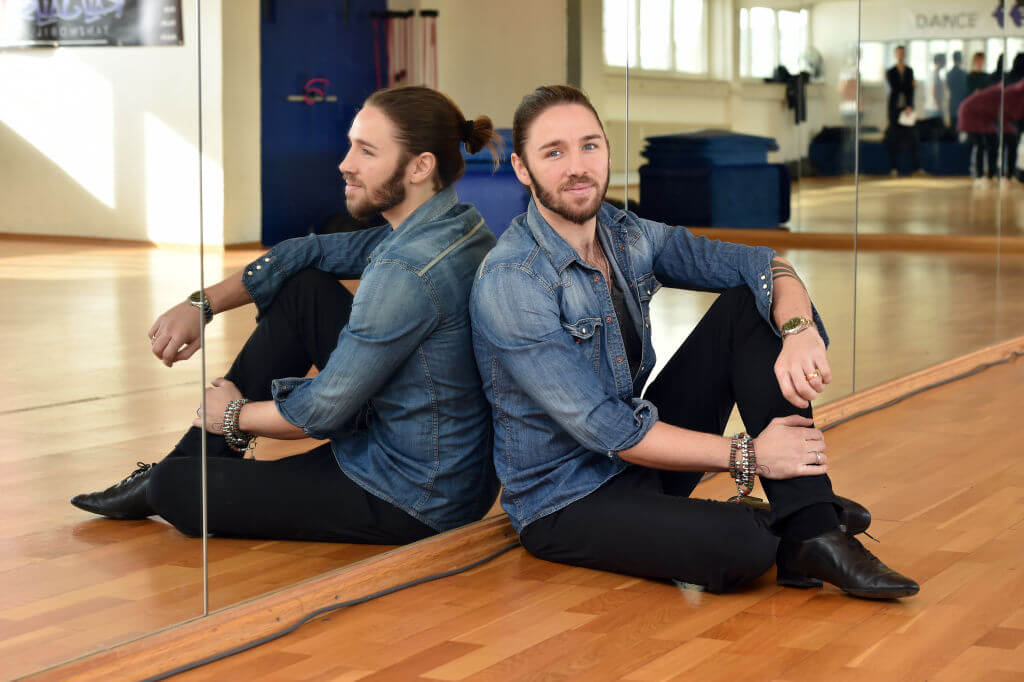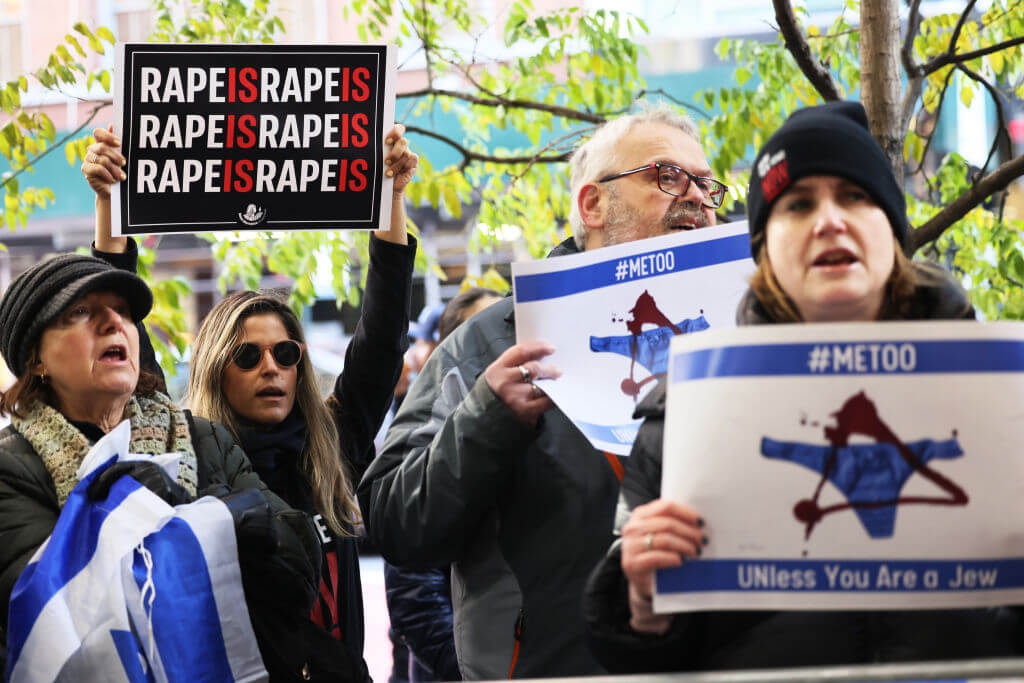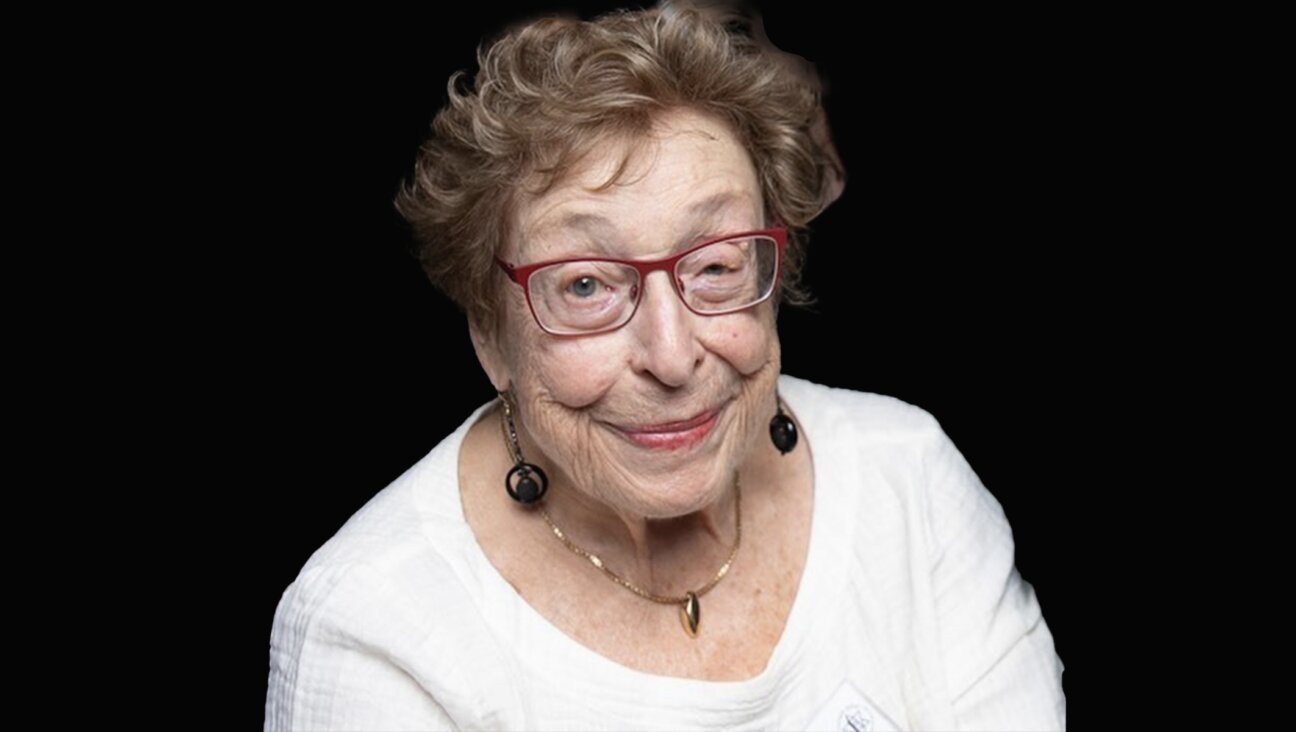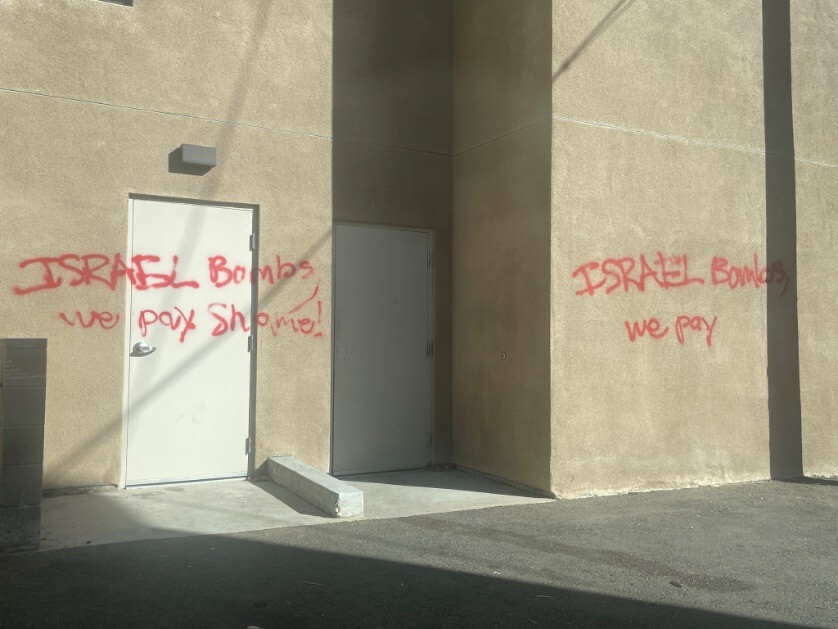A court ruling has transformed — and limited — the way New York state can regulate yeshivas
A judge in Albany ruled that the state no longer has the power to effectively force yeshivas to close for not teaching secular studies in a way that is ‘substantially equivalent’ to education in public school.
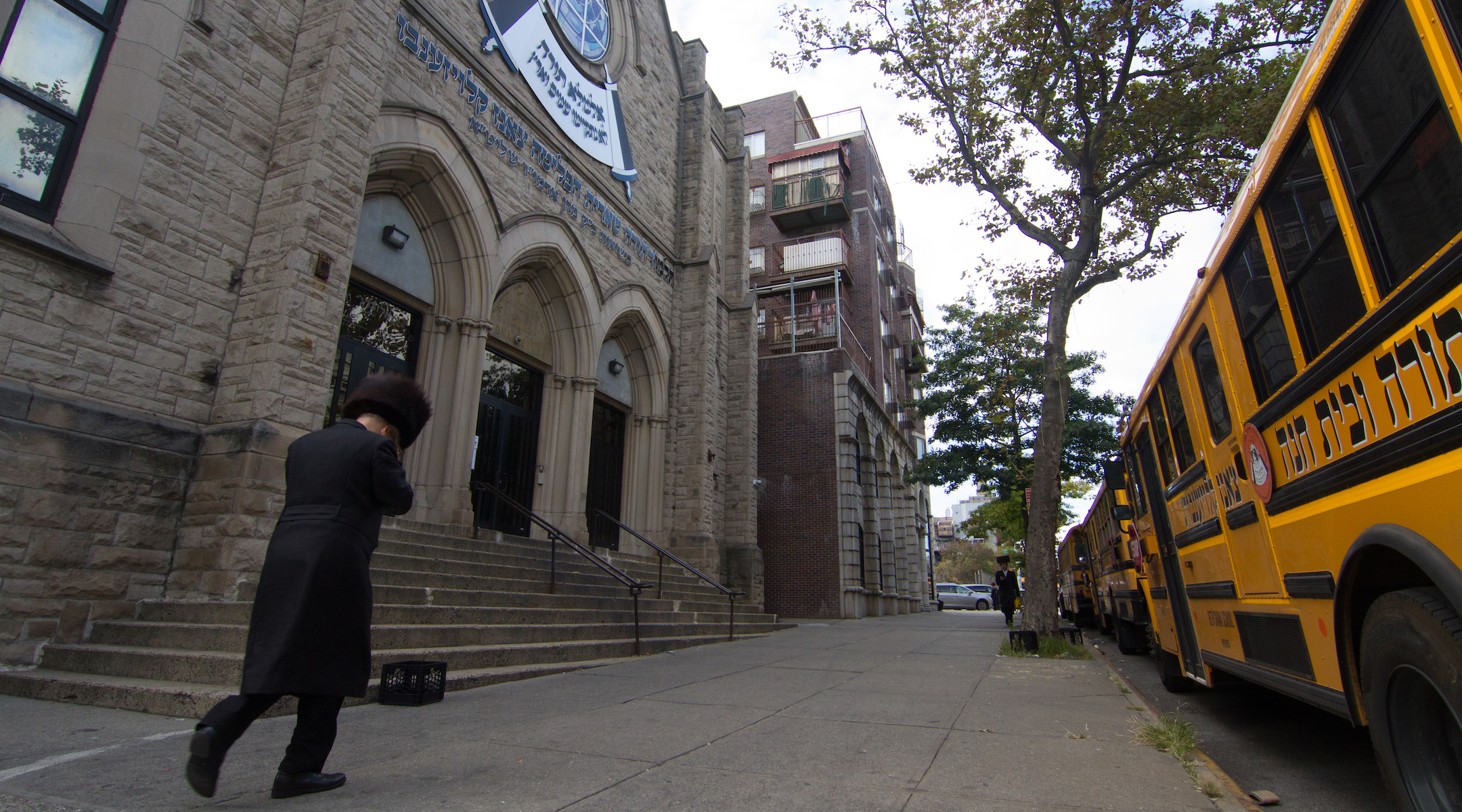
A man walks past an Orthodox yeshiva in Brooklyn, Sept. 29, 2020. (Daniel Moritz-Rabson)
NEW YORK (JTA) — What should happen when a yeshiva fails to teach its students the legally required amount of secular studies? And who should be held responsible: the school, or the parents who chose it?
Both of those questions were at the heart of a bombshell ruling in a New York state court last week that, if it stands, will transform how the state can regulate private schools. It also poses a challenge to advocates for increased secular education in yeshivas, who have spent years pushing the state to more strictly enforce its standards in schools.
It’s the latest major development in a years-long battle between an education department that seeks to compel secular education standards across private schools and haredi Orthodox yeshivas resisting coercion from the state.
In a trial that pitted several yeshivas and their advocates against the state’s education department, a judge in Albany ruled that the state no longer has the power to effectively force yeshivas to close for not teaching secular studies in a way that is “substantially equivalent” to education in public school. According to the ruling, state law says it’s the responsibility of parents, not schools, to ensure that children receive a “substantially equivalent” secular education.
But the court also ruled that the education requirements themselves still stand. The yeshivas and their supporters had taken the department to court, hoping that the judge would fully strike down the regulations that mandated secular education standards.
Both advocates and critics of the yeshivas are celebrating parts of the ruling and lamenting others. What’s clear is that the state’s mechanism for enforcing secular education standards in private schools will have to change, though what shape it will take remains to be seen.
“It highlights and it notes that the statute itself requires parents to ensure that their children receive a substantially equivalent education, but it doesn’t impose an obligation on the schools to provide that,” said Michael Helfand, a scholar of religious law and religious liberty at Pepperdine University, explaining the ruling. “If that’s the case, there’s no authority under the statute to close the school because the school failed to provide a ‘substantially equivalent’ education.”
The regulations at issue were approved in September, soon after The New York Times published the first in a series of articles investigating Hasidic yeshivas, reporting that a number of them received public funding but fell far short of secular education requirements. The yeshivas, and representatives of haredi Orthodox communities more broadly, have decried the articles as biased and inaccurate.
According to the new regulations, if yeshivas (or other private schools) did not provide a “substantially equivalent” secular education to their students, the state could compel parents to unenroll their children and place them in a school that meets state standards — effectively forcing the school to close.
The judge who wrote last week’s ruling, Christina Ryba, found “that certain portions of the New Regulations impose consequences and penalties upon yeshivas above and beyond that authorized” by law. Ryba wrote that the regulations exceed the state’s authority by forcing parents to withdraw their children.
She added that state law does not mandate that children must receive the requisite secular education “through merely one source of instruction provided at a single location.” She added that if children aren’t receiving the necessary instruction at yeshivas, they can still get it elsewhere, in some form of “supplemental instruction that specifically addresses any identified deficiencies.”
What that ruling means, Helfand said, is that the state will have to turn to other methods to enforce those standards, such as choosing to “tie particular requirements to the way in which schools receive funding.” The state could also investigate parents, not schools — which he described as a much more arduous undertaking.
“It would then have to slowly but surely make its way through each individual family or each individual child [and] ask questions about what they’re supplementing,” he said. “It’s very hard to see exactly how the New York State Education Department could, given this ruling, ensure that every child is receiving a basic education.”
For yeshivas and their advocates, he added, “It’s not the constitutional victory that I think some hoped for but it’s a very practical victory that in the end may stymie the state’s ability to actually impose significant regulation.”
That’s the way advocates of yeshivas — including parties to the petition — appear to be reading this ruling. A statement from Parents for Education and Religious Liberty in Schools, known as PEARLS, one of the petitioners, said the ruling gives “parents the right to send their children to the school of their choice. …In sum, it provides parents and parochial schools with both the autonomy and the protections that the regulations tried to strip away.”
Another advocate of yeshivas that was party to the case, the haredi umbrella organization Agudath Israel of America, saw the ruling as “not the complete victory many were [praying] for,” according to a statement, because it didn’t strike down last year’s regulations entirely. But the group was grateful that Ryba did rule out “the egregious overreach the Regulations sought,” including the “prospect of forcibly shutting down schools.”
Rabbi Avi Shafran, Agudath Israel’s director of public affairs, told JTA that the organization was “obviously relieved” by the ruling but feels the battle isn’t over. At the beginning of the year, Agudath Israel launched a campaign called “Know Us” that aims to counter what it calls a “smear campaign” by The New York Times.
“But with elements out there bent on pressuring yeshivos to accept their own personal educational philosophy, we remain on the alert for any future attempts to limit yeshivos or parental autonomy,” Shafran wrote in an email.
While Agudath Israel may see the ruling as a partial victory, that doesn’t mean advocates for secular education necessarily see it as a total defeat. Young Advocates for Fair Education, known as YAFFED, which submitted an amicus brief to the court in support of the Department of Education, said in a press release that the ruling “is of grave concern to all parents with children in non-public schools.” Beatrice Weber, YAFFED’s executive director, said the ruling will require the group to shift its strategy, which has until now focused on compelling the schools to teach secular studies.
But she is heartened that the core requirement to provide a threshold level of secular studies still stands for parents — and she’s skeptical that haredi communities will take the risk of asking parents to violate that requirement en masse. In the end, she believes more yeshivas will, in fact, become “substantially equivalent” in order to remove that risk.
“This victory they’re celebrating is really putting them in this corner,” Weber said. “We’ll see what they decide to do but none of the claims of [the regulations] being a violation of religious freedom — none of that was accepted.”
Weber acknowledges that the burden for secular education has now shifted to parents, and “there’s not going to be someone knocking on every door” to make sure parents comply. But she noted that many haredi families interact with the state because they receive forms of public assistance, which she said could provide a built-in mechanism to pressure them to comply.
“Any time they touch the government it’s going to come up,” she said. “Many Hasidic families deal with government programs a lot — whether it’s Medicaid, whether it’s food stamps. I can’t see community leaders saying, ‘Whatever, let the families figure it out.’”
A spokesperson for the state education department declined to say whether the state plans to appeal the ruling, or what it means for future oversight of yeshivas. But in a statement, the department said the ruling “validates the Department’s commitment to improving the educational experience of all students.”
The statement added: “We remain committed to ensuring students who attend school in settings consistent with their religious and cultural beliefs and values receive the education to which they are legally entitled.”
Whatever the future holds, Helfand says the ruling reflects a new way to read the law that, for years, has driven tensions between the state and yeshivas.
“I would have expected people reading the statute not to distinguish between whether ‘substantially equivalent’ is a parental obligation or a school obligation,” he said. “The fact that the court was able to slice the obligation in such a precise way — it’s something we haven’t seen before.”
This article originally appeared on JTA.org.
A message from our Publisher & CEO Rachel Fishman Feddersen

I hope you appreciated this article. Before you go, I’d like to ask you to please support the Forward’s award-winning, nonprofit journalism so that we can be prepared for whatever news 2025 brings.
At a time when other newsrooms are closing or cutting back, the Forward has removed its paywall and invested additional resources to report on the ground from Israel and around the U.S. on the impact of the war, rising antisemitism and polarized discourse.
Readers like you make it all possible. Support our work by becoming a Forward Member and connect with our journalism and your community.
— Rachel Fishman Feddersen, Publisher and CEO







